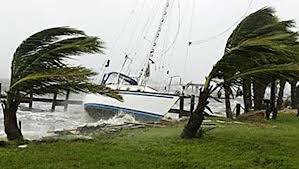
New York — Hurricane Zeta tore across the U.S. South on Thursday with strong winds that left a trail of downed trees, snapped power lines and killed at least three people.
The storm brought 110 mile-per-hour (175 km-per-hour) winds to the Louisiana coast and knocked out power to 2.4 million people from Louisiana to North Carolina.
A New Orleans man died after touching a live power line, while two others were killed in Mississippi and Georgia from the coastal storm surge and a wind-felled tree, police reported.
Crews overnight cleared major roadways of tree limbs and snapped electrical lines as residents hauled wind-swept debris to the curb in New Orleans. One man was injured when an apartment building collapsed.
Zeta is the fifth named storm to strike Louisiana this year and the 27th named storm this season, one less than the record set in 2005. Hurricanes are getting stronger and spinning slower, as they pick up energy from the heat in the oceans due to climate change.
New Orleans Mayor LaToya Cantrell urged residents to stay away from downed power lines while crews restored power.
“Now is not the time to go sightseeing,” Governor John Bel Edwards said.
Zeta spun up in the Caribbean Sea and went from tropical storm to a damaging, Category 2 hurricane in less than four days. It struck Mexico’s Yucatan Peninsula and raced across the Gulf of Mexico.
The storm steamed over warm Gulf waters at up to 20 mph (32 kph) riding a steering current that propelled it over the Appalachian Mountains. It will bring strong damaging winds to the Carolinas and southeastern Virginia, the NHC said.
This year’s hurricanes have cost homeowners and insurers billions of dollars for repairs, and cut U.S. oil and gas output from major oil companies by millions of barrels.
Zeta this week shut down two-thirds of offshore U.S. Gulf of Mexico oil production and led energy producers to turn off undersea pipelines and evacuate workers from 231 offshore platforms and drilling rigs.
U.S. oil companies including Hess Corp and W&T Offshore have cited the repeated Gulf Coast storms since June for missing production targets.
(Reporting by Kathleen Flynn; Additional reporting by Erwin Seba in Houston; Writing by Gary McWilliams; editing by Jonathan Oatis and Lisa Shumaker)



